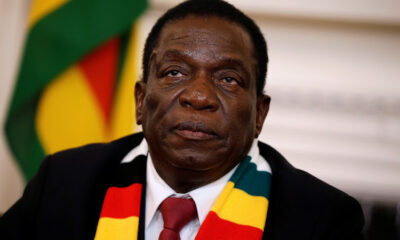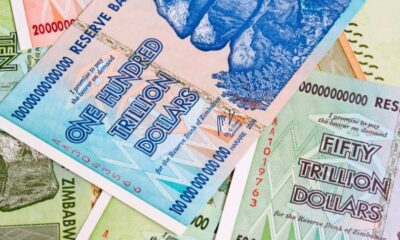Strictly Personal
The voice of the people is NOT the voice of God
Over the past seven months, ever since the military coup that ousted former Zimbabwe dictator Robert Gabriel Mugabe in November last year, the country has been inundated with several slogans and mantras meant to legitimise and justify those who took power – however, what is most painful is the use of blasphemy, through the abuse of God’s name for political expediency
Published
6 years agoon
Over the past seven months, ever since the military coup that ousted former Zimbabwe dictator Robert Gabriel Mugabe in November last year, the country has been inundated with several slogans and mantras meant to legitimise and justify those who took power – however, what is most painful is the use of blasphemy, through the abuse of God’s name for political expediency.
Although, Zimbabwe is, by far, not new to blasphemy by politicians – having witnessed the shameful comparison of Mugabe to our Lord Jesus Christ, and baseless claims by shadowy prophets that he had been specifically anointed by God to lead the nation, and no one was supposed to challenge him – but, the continued abuse of Jehovah’s name is worrying, to say the least.
Possibly, as a direct result of Mugabe’s claim that he was specifically appointed by God to lead this country – and that only He could remove him – those who ousted him have sought to justify their actions by insinuating that their actions were inspired by God.
Otherwise, how else can one explain the now all too familiar mantra claiming that, “the voice of the people is the voice of God”?
First of all, as every Zimbabwean knows, Mugabe was not removed by the people, but by the military, as he was held under house arrest, whilst being pushed to resign.
The call for people to go out onto the streets to call for his resignation was just a smokescreen for what was truly happening behind the scenes, in order to give impression of a popular uprising, so as to camouflage the military action – and, as in fact did happen, avoid international ramifications.
Let us not forget that the call for mass action came after the military had already intervened.
This, by any stretch of the imagination, can never be said to be the voice of God!
Secondly, even if we were to accept that what transpired last November was indeed a popular uprising, what justification is there to claim that this was the voice of God?
Since when has God spoken through popular or mass action?
As much as I am a firm believer in democracy and democratic values, we should separate these from the voice of God – as these are fundamentally divorced from each other.
God does not – and has never worked – through mass or popular action.
In fact, most acts of rebellion against God in the Bible were carried out through popular and mass action.
A couple of examples immediately come to mind – for instance, the mass call for God’s only begotten son Jesus Christ to be crucified – nearly everyone cried, “crucify Him!”.
That was not the voice of God.
Another example is when the children of Israel constantly demanded that they be returned to bondage in Egypt, whenever their plight in the wilderness became unbearable – even leading to them creating an idol for them to worship when Moses was up the mountain talking with God.
Furthermore, the children of Israel, later on, collectively demanded a human king from the prophet Samuel – an act that greatly pained God, as it was a direct rejection of His rule.
Several times, from that point onwards, the children of Israel – together as a mass – disobeyed God, as they made their own popular decisions that were not directed by Him.
It is, thus, clear that God never spoke through the people as a collective.
In fact, the true voice of God was always met with resistance from the people, as it was highly unpopular – and it came through His genuine prophets.
If ever there were to be Gallup polls in those days, the people with the lowest approval ratings would have been the genuine prophets of God – as the voice of the people was always contrary to that of God.
Even during the days of the apostles, the voice of God that they spoke of was seldom received well, as it was not the voice of the people – leading to widespread persecution and even death.
Similarly, today is not any different – as the voice of the people is surely not the voice of God.
The desires of humans are always mostly of the world and of the flesh, and are not necessarily of the Spirit and inspired by God.
Similarly, Zimbabweans’ heed to go onto the streets in November last year, was inspired more by long-term suffering and pain that they had endured under Mugabe, than an instruction from God.
There was never any genuine prophet of God who had come forward to lead the nation with a direct message from Him – as did Moses – in calling for Mugabe to “let His people go”.
What Zimbabwe, and the world over, lacks are genuine prophets of God – who are truly sent and speak His instructions.
As I have written so many times before, what we have today are mere soothsayers, predictors and healers – from whose power only themselves know – who are more like sangomas, rather than prophets of Jehovah God, who relay His messages.
They are better at predicting what is going to happen, or telling someone their phone numbers, and healing the sick, than actually transmitting messages from God.
The genuine prophets of God were instructed by Him to convey very important messages, and even to appoint leaders that He would have specifically chosen – whilst, at the same time keeping those leaders in check.
Which leaders, have our so-called prophets today, ever appointed as a direct instruction from God?
If the current leadership is truly from God, which prophet was sent to appoint and announce them?
Read Also: Is Anas The Bill Cosby Of Ghana?
I do not recall ever seeing or hearing of a prophet who was sent to announce to Mugabe that God had said that he should step down, and anointing a new leader – as did Samuel when he told Saul, whom he had anointed earlier on, that God had rejected him, after anointing David.
Even Father Fidelis Mukonori – who was heavily involved in the talks between the military and Mugabe leading to his resignation – at no point, did he ever claim that he had carried a message from God for Mugabe to step down, and Mnangagwa to take over – but, made it very clear that he was just one of the negotiators.
In fact, that is why the current leadership would rather hide behind “the voice of the people’” because God never sent any prophet to appoint them.
Predicting a future leader, or the death of a leader, is not prophecy from God, but mere soothsaying – just as a sangoma would do – but, God directly sends His prophets to be directly involved in the appointment of His chosen leader.
Genuine prophets rebuked and corrected those leaders whenever they went against God’s word, as did Samuel to Saul – when he disobeyed His instructions – and Nathaniel to David – after he had committed adultery with Uriah’s wife.
Similarly, other prophets as Elijah and Elisha were sent by God to rebuke and carry instructions to kings and the people – whose messages proven highly unpopular.
However, today we have populist prophets, who are after making as many powerful friends as possible, so as to freely make their millions of dollars from fleecing the people, and shoddy dealings.
They would rather sup with leaders, even when they are corrupt, or abusing and oppressing their own people.
Genuine prophets of God are not there to make friends, or please any section of society, but are strictly there to convey what Jehovah would have instructed them – most of which makes them more enemies than friends, especially from the ruling elite, and the general population, as most of us are prone to go against God’s Word.
If ever we witness a so-called prophet who says or does things that are meant to endear him or herself to a certain section of society, then they are not of God – as with biblical times, genuine prophets were more isolated and hated by nearly everyone.
Yet, these so-called prophets we have today seek favour from men (people), especially from those in power, or the general population – so that they may attend their churches and give them money.
Therefore, as much as leaders would want to be accepted by the people, or to win democratic elections, there can never be any justification to blasphemy against Jehovah – and it is such a shame that those who claim to be men and women of God never stand up against such acts.
The voice of the people is through the democratic process, but the voice of God is through His genuine prophets – and the two are very different.
As a relatively democratic country, Zimbabweans should campaign freely and peacefully – based purely on their policies and manifestoes – but, should never ever abuse the sacred name of God for their selfish political gains.
God is not against democracy, but let us pray for His blessings for our nation, without bringing His name into disrepute – as that will only spell further disaster for our nation.
Commentator: Tendai Ruben Mbofana.
He is the Programmes Director with the Zimbabwe Network for Social Justice (ZimJustice).
You may like
-


Zimbabwe calls on UK to return remains of 19th century warriors
-


Zimbabwe bans police from using mobile phones while on duty
-


Zimbabwe to compensate foreign, local farmers for land seizures by Mugabe
-


Zimbabwe’s president promises currency stabilisation measures
-


Zimbabwe’s new currency under strain, months after launch
-


Zimbabwe to kill 200 elephants for drought-ravaged communities
Strictly Personal
Budgets, budgeting and budget financing, By Sheriffdeen A. Tella, Ph.D.
Published
2 days agoon
November 20, 2024
The budget season is here again. It is an institutional and desirable annual ritual. Revenue collection and spending at the federal, State and local government levels must be authorised and guided by law. That is what budget is all about. A document containing the estimates of projected revenues from identified sources and the proposed expenditure for different sectors in the appropriate level of government. The last two weeks have seen the delivery of budget drafts to various Houses of Assembly and the promise that the federal government would present its draft budget to the National Assembly.
Do people still look forward to the budget presentation and the contents therein? I am not sure. Citizens have realised that these days, governments often spend money without reference to the approved budget. A governor can just wake up and direct that a police station be built in a location. With no allocation in the budget, the station will be completed in three months. The President can direct from his bathroom that 72 trailers of maize be distributed to the 36 states as palliatives. No budget provision, and no discussion by relevant committee or group.
We still operate with the military mentality. We operated too long under the military and of the five Presidents we have in this democracy, two of them were retired military Heads of State. Between them, they spent 16 years of 25 years of democratic governance. Hopefully, we are done with them physically but not mentally. Most present governors grew up largely under military regimes with the command system. That is why some see themselves as emperor and act accordingly. Their direct staff and commissioners are “Yes” men and women. There is need for disorientation.
The importance of budget in the art of governance cannot be overemphasized. It is one of the major functions of the legislature because without the consideration and authorisation of spending of funds by this arm of government, the executive has no power to start spending money. There is what we refer to as a budget cycle or stages. The budget drafting stage within the purview of the executive arm is the first stage and, followed by the authorisation stage where the legislature discusses, evaluates and tinkers with the draft for approval before presenting it to the President for his signature.
Thereafter, the budget enters the execution phase or cycle where programmes and projects are executed by the executive arm with the legislature carrying out oversight functions. Finally, we enter the auditing phase when the federal and State Auditors verify and report on the execution of the budgets. The report would normally be submitted to the Legislature. Many Auditor Generals have fallen victim at this stage for daring to query the executives on some aspects of the execution in their reports.
A new budget should contain the objectives and achievements of the preceding budget in the introduction as the foundation for the budget. More appropriately, a current budget derives its strength from a medium-term framework which also derives its strength from a national Development Plan or a State Plan. An approved National Plan does not exist currently, although the Plan launched by the Muhammadu Buhari administration is in the cooler. President Tinubu, who is acclaimed to be the architect of the Lagos State long-term Plan seems curiously, disillusioned with a national Plan.
Some States like Oyo and Kaduna, have long-term Plans that serve as the source of their annual budgets. Economists and policymakers see development plans as instruments of salvation for developing countries. Mike Obadan, the former Director General of the moribund Nigeria Centre for Economic and Management Administration, opined that a Plan in a developing country serves as an instrument to eradicate poverty, achieve high rates of economic growth and promote economic and social development.
The Nigerian development plans were on course until the adoption of the World Bank/IMF-inspired Structural Adjustment Programme in 1986 when the country and others that adopted the programme were forced to abandon such plan for short-term stabilisation policies in the name of a rolling plan. We have been rolling in the mud since that time. One is not surprised that the Tinubu administration is not looking at the Buhari Development Plan since the government is World Bank/IMF compliant. It was in the news last week that our President is an American asset and by extension, Nigeria’s policies must be defined by America which controls the Bretton Woods institutions.
A national Plan allows the citizens to monitor quantitatively, the projects and programmes being executed or to be executed by the government through the budgeting procedure. It is part of the definitive measures of transparency and accountability which most Nigerian governments do not cherish. So, you cannot pin your government down to anything.
Budgets these days hardly contain budget performance in terms of revenue, expenditure and other achievements like several schools, hospitals, small-scale enterprises, etc, that the government got involved in successfully and partially. These are the foundation for a new budget like items brought forward in accounting documents. The new budget should state the new reforms or transformations that would be taking place. Reforms like shifting from dominance of recurrent expenditure to capital expenditure; moving from the provision of basic needs programmes to industrialisation, and from reliance on foreign loans to dependence on domestic fund mobilisation for executing the budget.
That brings us to the issue of budget deficit and borrowing. When an economy is in recession, expansionary fiscal policy is recommended. That is, the government will need to spend more than it receives to pump prime the economy. If this is taken, Nigeria has always had a deficit budget, implying that we are always in economic recession. The fact is that even when we had a surplus in our balance of payment that made it possible to pay off our debts, we still had a deficit budget. We are so used to borrowing at the national level that stopping it will look like the collapse of the Nigerian state. The States have also followed the trend. Ordinarily, since States are largely dependent on the federal government for funds, they should promote balanced budget.
The States are like a schoolboy who depends on his parents for school fees and feeding allowance but goes about borrowing from classmates. Definitely, it is the parents that will surely pay the debt. The debt forgiveness mentality plays a major role in the process. Having enjoyed debt forgiveness in the past, the federal government is always in the credit market and does not caution the State governments in participating in the market. Our Presidents don’t feel ashamed when they are begging for debt forgiveness in international forum where issues on global development are being discussed. Not less than twice I have watched the countenance of some Presidents, even from Africa, while they looked at our president with disdain when issues of debt forgiveness for African countries was raised.
In most cases, the government, both at the federal and state cannot show the product of loans, except those lent by institutions like the World Bank or African Development Bank for specific projects which are monitored by the lending institutions. In other cases, the loans are stolen and transferred abroad while we are paying the loans. In some other cases, the loans are diverted to projects other than what the proposal stated. There was a case of loans obtained based on establishing an international car park in the border of the State but diverted to finance the election of a politician in the State. The politician eventually lost the election but the citizens of the State have to be taxed to pay the loan. Somebody as “Nigeria we hail thee”.
Transformation in budgeting should commence subsequently at the State and federal level. Now that local government will enjoy some financial autonomy and therefore budgeting process, they should be legally barred from contracting foreign loans. They have no business participating in the market. They should promote balanced budget where proposed expenditures must equal the expected revenues from federal and internal sources. The State government that cannot mobilise, from records, up to 40 percent of its total budget from IGR should not be supported to contract foreign loans. The States should engage in a balanced budget. The federal government budget should shift away from huge allocations to recurrent expenditure towards capital expenditure for capital formation and within the context of a welfarist state.
Sheriffdeen A. Tella, Ph.D.
Strictly Personal
African Union must ensure Sudan civilians are protected, By Joyce Banda
Published
4 weeks agoon
October 25, 2024
The war in Sudan presents the world – and Africa – with a test. This far, we have scored miserably. The international community has failed the people of Sudan. Collectively, we have chosen to systematically ignore and sacrifice the Sudanese people’s suffering in preference of our interests.
For 18 months, the Rapid Support Forces (RSF) and the Sudanese Armed Forces (SAF) have fought a pitiless conflict that has killed thousands, displaced millions, and triggered the world’s largest hunger crisis.
Crimes against humanity and war crimes have been committed by both parties to the conflict. Sexual and gender-based violence are at epidemic levels. The RSF has perpetrated a wave of ethnically motivated violence in Darfur. Starvation has been used as a weapon of war: The SAF has carried out airstrikes that deliberately target civilians and civilian infrastructure.
The plight of children is of deep concern to me. They have been killed, maimed, and forced to serve as soldiers. More than 14 million have been displaced, the world’s largest displacement of children. Millions more haven’t gone to school since the fighting broke out. Girls are at the highest risk of child marriage and gender-based violence. We are looking at a child protection crisis of frightful proportions.
In many of my international engagements, the women of Sudan have raised their concerns about the world’s non-commitment to bring about peace in Sudan.
I write with a simple message. We cannot delay any longer. The suffering cannot be allowed to continue or to become a secondary concern to the frustrating search for a political solution between the belligerents. The international community must come together and adopt urgent measures to protect Sudanese civilians.
Last month, the UN’s Independent International Fact-Finding Mission for Sudan released a report that described a horrific range of crimes committed by the RSF and SAF. The report makes for chilling reading. The UN investigators concluded that the gravity of its findings required a concerted plan to safeguard the lives of Sudanese people in the line of fire.
“Given the failure of the warring parties to spare civilians, an independent and impartial force with a mandate to safeguard civilians must be deployed without delay,” said Mohamed Chande Othman, chair of the Fact-Finding Mission and former Chief Justice of Tanzania.
We must respond to this call with urgency.
A special responsibility resides with the African Union, in particular the AU Commission, which received a request on June 21 from the AU Peace and Security Council (PSC) “to investigate and make recommendations to the PSC on practical measures to be undertaken for the protection of civilians.”
So far, we have heard nothing.
The time is now for the AU to act boldly and swiftly, even in the absence of a ceasefire, to advance robust civilian protection measures.
A physical protective presence, even one with a limited mandate, must be proposed, in line with the recommendation of the UN Fact-Finding Mission. The AU should press the parties to the conflict, particularly the Sudanese government, to invite the protective mission to enter Sudan to do its work free from interference.
The AU can recommend that the protection mission adopt targeted strategies operations, demarcated safe zones, and humanitarian corridors – to protect civilians and ensure safe, unhindered, and adequate access to humanitarian aid.
The protection mission mandate can include data gathering, monitoring, and early warning systems. It can play a role in ending the telecom blackout that has been a troubling feature of the war. The mission can support community-led efforts for self-protection, working closely with Sudan’s inspiring mutual-aid network of Emergency Response Rooms. It can engage and support localised peace efforts, contributing to community-level ceasefire and peacebuilding work.
I do not pretend that establishing a protection mission in Sudan will be easy. But the scale of Sudan’s crisis, the intransigence of the warring parties, and the clear and consistent demands from Sudanese civilians and civil society demand that we take action.
Many will be dismissive. It is true that numerous bureaucratic, institutional, and political obstacles stand in our way. But we must not be deterred.
Will we stand by as Sudan suffers mass atrocities, disease, famine, rape, mass displacement, and societal disintegration? Will we watch as the crisis in Africa’s third largest country spills outside of its borders and sets back the entire region?
Africa and the world have been given a test. I pray that we pass it.
Dr Joyce Banda is a former president of the Republic of Malawi.
EDITOR’S PICK


IMF mission concludes 4th loan program assessment in Egypt
Following the completion of a recent visit to Egypt, the International Monetary Fund (IMF) has announced that its mission had...


Mali’s junta names spokesman Abdoulaye Maiga new Prime Minister
A day after dismissing Choguel Maiga for criticising the government, Mali’s governing junta named its spokesperson, Abdoulaye Maiga, as Prime...


Brazilian meatpacker JBS invests $2.5 billion in Nigeria, builds six facilities
Brazilian meatpacker JBS says it has inked a memorandum of understanding with the Nigerian government for a $2.5 billion investment...


China’s Xi meets with Morocco’s Crown Prince
Morocco’s official media reports that Chinese President, Xi Jinping, visited Morocco briefly on Thursday. According to Morocco’s MAP, Crown Prince...


65% of Nigerian households lack money for healthy food—Survey
A survey conducted by the National Bureau of Statistics (NBS) has revealed that around 65% of Nigerian households, which is...


Ghana partners with The Gambia to provide free roaming services
Ghana and The Gambia are in the process of launching free roaming services that will enhance a West African connectivity....


Zambia: APP leader lampoons PF over pledge to reverse forfeited properties
Leader of one of Zambia’s opposition parties, Advocates for People’s Prosperity (APP), Mwenye Musenge, has criticised the Patriotic Front (PF)...


Ghanaian winger Fatawu out for season with ACL injury
Ghana and Leicester City winger, Abdul Fatawu, has been ruled out of the rest of the EPL season after suffering...


DRC authorities arrest six over break-in at Lumumba’s Mausoleum
Police in the Democratic Republic of Congo (DRC) say six people have been arrested over a break-in and vandalism at...


Finnish court imprisons Nigeria’s Simon Ekpa for aiding terrorism
Simon Ekpa, a Nigerian separatist leader based abroad, has been placed under detention by the Päijät Häme District Court...
Trending
-

 Metro1 day ago
Metro1 day agoNigerian Senate confirms influx of terrorists from Mali, Burkina Faso into the country
-

 Musings From Abroad1 day ago
Musings From Abroad1 day agoFinnish court imprisons Nigeria’s Simon Ekpa for aiding terrorism
-

 Metro1 day ago
Metro1 day agoZambia: APP leader lampoons PF over pledge to reverse forfeited properties
-

 Sports1 day ago
Sports1 day agoGhanaian winger Fatawu out for season with ACL injury


